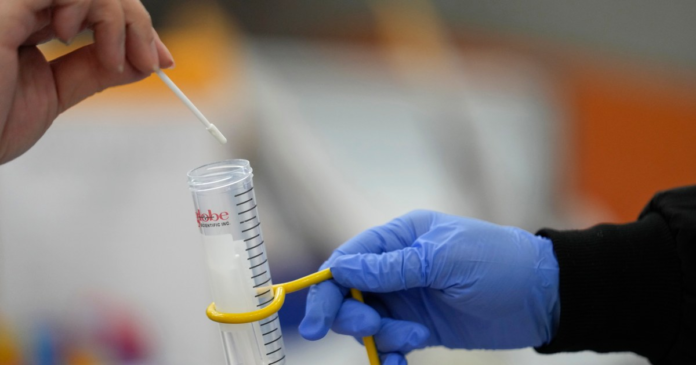Following the Biden administration’s implementation of a new Covid-19-related travel requirement for passengers flying in from China, Asian American advocates and experts are urging caution and nuance amid years of heightened anti-Asian violence.
Several Asian American organizations and leaders have expressed concern over the requirement of a pre-departure negative Covid test from those flying in from the country. The policy, implemented by the Centers for Disease Control and Prevention last week, triggered fears that such rules could lead to racist fallout, particularly during a period of heightened anti-Asian and anti-Chinese sentiment.
“What I would ask everyone to do is, again, be careful not to conflate the virus with an ethnicity or a group of people,” said John C. Yang, president and executive director of Asian Americans Advancing Justice | AAJC. “When we have seen these types of policies, there are always those people on the fringe that will use it as an excuse to scapegoat our community as a whole or take it as a way of targeting a community.”
The CDC did not respond to NBC News’ request for comment.
As of Thursday, the health organization now requires a negative result within two days of departure, or proof of recovery within the last 90 days, for all air passengers from China, Hong Kong and Macao. The new rule comes as cases surged after the country eased its “zero-Covid” approach last month in response to mass protests across the nation. Beijing lifted its quarantine requirements for travelers as well as its own domestic rules. In turn, cases skyrocketed and the nation soon witnessed a rapid overcrowding and congestion of medical facilities.
According to the CDC, the new travel precautions were a necessity given the lack of transparency and adequate data from Beijing. But some groups like Stop AAPI Hate, a nonprofit that tracks incidents of hate and discrimination against Asian Americans and Pacific Islanders, strongly opposed the policy. The group pointed to previous travel restrictions under the Trump administration in January 2020 that coincided with a rise in hate incidents against the racial group.
Since March 2020, one-fifth of the 11,467 incidents reported to Stop AAPI Hate over the course of more than two years scapegoated Asians and Asian Americans, “wrongfully blaming them for COVID-19, espionage on behalf of the Chinese Communist Party, or economic insecurity,” according to a report from the organization.
“It is also yet another example of the government’s historical penchant for perpetuating the racist trope of Asian foreigners bringing diseases to America,” Cynthia Choi, a co-founder of the organization, said in a statement. “We are still receiving reports of hate incidents blaming Asians and Asian Americans for the pandemic as a result of the government’s actions in 2020; three years later, there is no excuse for repeating the same mistakes.”
Both the nonprofit and Yang pointed out another concern: that the policy appears to single out China among other countries that have similar Covid rates. But from a health standpoint, Dr. Tung Nguyen, a professor of medicine at the University of California, San Francisco, said the issue is complex. Thus far, medical experts are still unsure of the severity of the country’s Covid spread. Without transparency from China, particularly in data around possible variants, transmission to the U.S. could have a significant impact, he added.
“If there is a variant there that may not be covered by our vaccines and/or not responsive to the drugs we currently have, introducing that to the US could be devastating,” Nguyen said in an email. “This is the justification for picking on China as opposed to other countries at least.”
Still, the policy’s efficacy remains questionable. Nguyen said that the rule could help slow the spread for a few weeks, but if travelers who have visited China end up going to other countries and infecting others there, then returning to the U.S. without testing, there won’t be much of a long-term benefit.
Yang said that ultimately, the policy itself isn’t the main concern, but rather the larger anti-Chinese environment under which the rule has been imposed. And it’s an issue that extends beyond the pandemic. Citing the many Asian American scientists who have been falsely accused of espionage and the formation of the House Select Committee on China, Yang said the Sinophobic sentiment could fuel the undercurrent of racism in the U.S.
“We recognize that there are true national security concerns as it relates to the Chinese government,” Yang said. “But we are concerned that that is another place where it will be an excuse to China-bash and thereby cause a backlash against Chinese Americans and the Asian American community as a whole.”
While some may attempt to use the travel rules as justification for nationalism amid tense U.S.-China foreign relations, Yang said much has changed since the beginning of the pandemic, when many in the public were less aware of how language and policies could affect Asian Americans. And he’s hopeful that lawmakers, influencers and others have a better awareness of how to discuss these public health matters.
With new China travel restriction in place, Asian Americans urge nuanced caution
Recent Comments
on Army vs. Coastal Carolina live stream, how to watch online, CBS Sports Network channel finder, odds
on AL Rookie of the Year Julio Rodriguez Spreads Joy and Sportsmanship to the Youth of Loma de Cabrera
on After UFC Fallout, Conor McGregor Offers a Valuable Piece of Advice to Free Agent Francis Ngannou
on Dubai International Airport sees 41.6 million passengers in first half of year, more than in 2019
on Devout athletes find strength in their faith. But practicing it and elite sports can pose hurdles
on Despite strong Lunar New Year holiday data, consumer spending in China isn’t roaring back just yet
on Dave Portnoy: Taylor Swift’s security should ‘drag Kim Kardashian to jail’ if she attends Eras Tour
on CONCEPT ART: New Details Revealed for Disney Cruise Line Lookout Cay at Lighthouse Point Destination
on “Completely Knocked Me Out”: Rob Lowe Recalls Boxing Match With Tom Cruise On 1983 Brat Pack Classic
on CBS Sports, Serie A announce new TV rights deal; Paramount+ to air over 400 Italian soccer matches
on Cam Newton’s Violent Public Incident Draws Hilarious Reaction From 3x All-Star: “Where Do I Sign Up
on Boston College vs. Army live stream, how to watch online, CBS Sports Network channel finder, odds
on Angel Reese Launches Foundation Dedicated To Empowering Women Through Sports & Financial Literacy
on A weaker dollar, skyrocketing prices and ‘record’ visitor numbers: Good luck in Europe this summer




